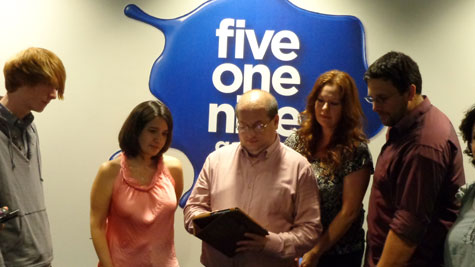One Third of Gamers Say De-Stressing Element of Games Positively Impacts Job, Relationships, Parenting or Schoolwork
main
Video Coverage
SomaTone Interactive’s Nick Thomas on the Breaking into the Game Industry as an Audio Professional, the Sound of Casual Gaming and How to Optimally use Audio in Your Game
Nick Thomas is talented enough to have not one, but two careers in two different and incredibly competitive industries. Starting off as an Engineer/Mixer for some of Sony Music’s top acts (Destiny’s Child and Michael Jackson to name a few), he is now the founder and CEO of SomaTone Interactive, a top provider of audio services in the Casual Gaming Industry. We recently spoke to Thomas about his interests in casual gaming and what he thinks creators should do to the audio elements of their games.
What made you interested in video game audio?
I have been a bona fide video game nerd for as long as I can remember. Some of my earliest memories are of playing Pitfall, and Combat on my old Atari. This love of games has stayed with me most of my life, with my children being the only life event that has successfully distracted me from playing games.
My second love has always been music. I attended Berklee College of Music, and studied Music Production with the intention of being a record producer/engineer. I did in fact spend a few years making records, and worked with some amazing artists, such as Carlos Santana, Destiny’s Child, Michael Jackson, Celine Dion, and others. However, the music industry leaves little room in life for other competing interests (such as family) and so I made a decision to fuse my two great passions, music and games, and SomaTone Interactive Inc. is the love child of this marriage.
Can you tell us more about the creation of SomaTone Interactive, Inc.? What is its mission?
Well, we actually have our mission defined. Here it is:
“SomaTone serves to bridge the gap between interactive media producers and audio professionals by providing high quality creative content, as well as leadership and management from a team of highly trained industry veterans. By including a layer of creative leadership into the production pipeline, SomaTone serves to leverage the vision of our clients and enhance that vision with through our experienced perspective”
What casual game do you feel uses audio successfully? How?
Of our portfolio of over 1000 games titles (nearly all casual), I continue to think Peggle is one of the best examples of how audio successfully enhances the game play experience.
There is a casino aspect to Peggle, and the SFX and music provide the player with not only a more fun and satisfying experience, but also help convey information about how the player is performing, and to reward the player for doing well. No one plays Peggle with the sound off, which unfortunately is not true of many social/mobile games which, (often due to poor audio) have effectively conditioned these players to turn the sound off.
What is a common mistake developers make with game audio? How can it be avoided?
The most common mistake that drives us crazy is not leaving time on the back end for the audio polish stage. Nearly 50 percent of the audio experience comes in the integration and final mix/polish, in which all the subtle details are messaged into place, and a truly cohesive game with amazing sound results.
What advice can you offer developers when considering their game’s audio?
Don’t wait until the end to address your audio needs, and leave room in your schedule for a final mix/polish of the audio delivered. No matter how experienced the team, and regardless of the quality of the individual assets, if they are not properly integrated, balanced, and tweaked for timing, pitch, and creative accuracy, the end result will not achieve the results you are hoping for.
Video Coverage
FiveOneNine Games’ Lloyd Melnick: Taking Chances and Reaping Rewards
Lloyd Melnick keeps busy. He founded and sold a game company to Playdom, ran Disney’s European and Latin American social game business, and is now the CEO of FiveOneNine Games. He is well-known for making bold decisions. However, it is only if there is worth in taking the risk. He is always looking to push the limits.
Exciting Changes in the Market
With his extensive involvement and background in the social games sector, Melnick has seen social features and games become the newest standard in how games are designed and monetized. He believes the all-age appeal is at the core of all this. “There is social game content for every individual, not just young males or middle aged women,” says Melnick. “Instead, anyone can find something they enjoy in casual gaming.”
With the emergence of different types of games, the market has undergone a change. Melnick has noticed a couple of trends that stand out to him: the fragmentation of the tablet market, cross-platform play, and the arrival of international content. “Odds are we will see some top content for Eastern Europe, Latin America, who knows where,” says Melnick. He believes this evolving market provides more opportunity for developers. “The market is much more diverse, so you can now make an appealing game without having to pander to a very small audience.”
It can be a little intimidating entering such an innovative market. Melnick advises letting content be the leading factor to your decisions. “Think content first: How are you going to make the most compelling product for your audience?” asks Melnick. “Once you have your product strategy, then analyze which platform is the most appropriate vehicle.”
Melnick’s past experiences provide him with the insight and skills necessary to do his job well. From a self-financed game at a startup company to leading a team at Disney’s Playdom, he learned ways to build FiveOneNine Games while integrating their activities with the strengths of The E.W. Scripps Company and Capital Broadcasting, their parent companies.
“FiveOneNine Games is committed first to entertaining its players—but then we also want to enlighten and engage them by integrating issues and content that make a difference in people’s lives,” says Melnick. Look forward to just such a game on Facebook soon.










